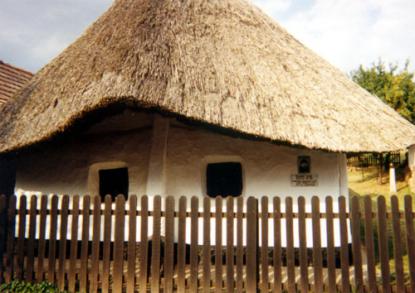2024. December 26. Thursday
Region House - Tard
 |
Address: 3416, Tard Béke utca 55-57.
Phone number: (49) 432-903, (49) 335-053
E-mail: tardpohi@freemail.hu
Opening hours: 15.04-30.10.: Tue-Sun 11-17
|
Museum tickets, service costs:
|
Ticket for adults
|
300 HUF
|
|
|
Ticket for students
|
200 HUF
|
|
|
Ticket for pensioners
|
200 HUF
|
Entering the house we will first see the kitchen stove, then the simple metal and clay utensils cooking instruments, etc. hanging on the wall. Most part of the kitchen is occupied by the stove. Apart from baking there is not much chance for any other activities. Once in a while the kitchen also serves as the scene for family dining.

In the room there is the mud stove, the cradle and the bed. Along the wall there is the corner bench, beside the other end of which there is a sleeping bed. This latter one is covered by a blanket, with a fur coat on the top. Religious icons, plates and memory cards are hanging on the wall.
Zoltán Szabó writes the following about the life in the room: "Not only does the family closes themselves up in the narrow room, but they also bring their cask of cabbage, their chickens, and only the major animals stay in the stable. The smell of the cabbage, the chickens and the lunch is mixed with the vapor coming through the mud floor. The mud walls themselves suck up the moisture, and as a result the whole room is filled with a lukewarm and heavy air. This is the place where the children are running to and fro, barefoot, though the floor is hardly any warmer than outside the earth."
The family keep their foods in the lards. Boxes and bags are used for storing the grains and potatoes. The washing and the worn-out clothes are also kept here.
The animals are kept in the rear part of the courtyard. The stable was one of the favorite place for the men too. Here the older ones exchanged their views about the crop outlooks, politics, etc., whereas the younger ones learned how to deal with the animals.
The last samples of the conventional houses have all been destroyed or pulled down. Today the families build their houses of concrete and stones.

In the room there is the mud stove, the cradle and the bed. Along the wall there is the corner bench, beside the other end of which there is a sleeping bed. This latter one is covered by a blanket, with a fur coat on the top. Religious icons, plates and memory cards are hanging on the wall.
Zoltán Szabó writes the following about the life in the room: "Not only does the family closes themselves up in the narrow room, but they also bring their cask of cabbage, their chickens, and only the major animals stay in the stable. The smell of the cabbage, the chickens and the lunch is mixed with the vapor coming through the mud floor. The mud walls themselves suck up the moisture, and as a result the whole room is filled with a lukewarm and heavy air. This is the place where the children are running to and fro, barefoot, though the floor is hardly any warmer than outside the earth."
The family keep their foods in the lards. Boxes and bags are used for storing the grains and potatoes. The washing and the worn-out clothes are also kept here.
The animals are kept in the rear part of the courtyard. The stable was one of the favorite place for the men too. Here the older ones exchanged their views about the crop outlooks, politics, etc., whereas the younger ones learned how to deal with the animals.
The last samples of the conventional houses have all been destroyed or pulled down. Today the families build their houses of concrete and stones.
